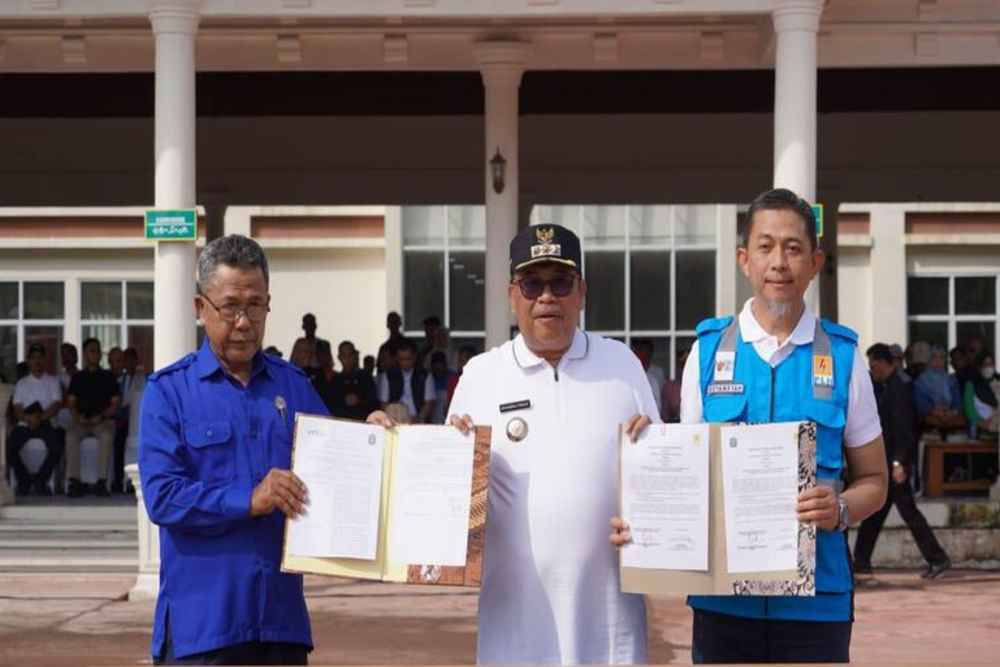Indonesia continues to prioritize rural development through strategic partnerships, especially in the agriculture sector. A recent collaboration between state utility giant PT PLN (Persero) and the Takalar Regency Government in South Sulawesi stands as a testament to this commitment. The partnership focuses on expanding agricultural electricity infrastructure, aiming to empower farmers and improve agricultural productivity in the region.
This article explores the significance of this collaboration, its long-term benefits, and how it fits into Indonesia's broader goals of energy equity and agricultural modernization.
The Partnership: Driving Rural Energy Access
The collaboration between PLN and the Takalar government was formalized through a memorandum of understanding (MoU), which outlines their shared objective to support electrification for agricultural purposes.
PLN's South Sulawesi, Southeast Sulawesi, and West Sulawesi (Sulselrabar) regional office stated that the initiative is a response to the local government’s request to provide reliable electricity access to farming areas. Electricity access is crucial for powering irrigation systems, processing machines, cold storage facilities, and other essential agricultural operations.
By targeting rural zones in Takalar—a regency known for its agricultural potential—PLN is strategically enhancing energy availability in support of food security and local economic growth.
“Electricity is not just about lighting homes—it powers development, agriculture, and industry,” said a PLN official during the MoU signing ceremony.
Agricultural Impact and Economic Empowerment
The agricultural electricity infrastructure project is designed to benefit thousands of farmers in Takalar. By providing stable electricity to farming areas, the initiative enables more efficient irrigation, reduces post-harvest losses, and promotes value-added processing activities directly at the source.
Key expected benefits include:
- Increased crop yields due to better irrigation and climate control.
- Reduced energy costs compared to diesel-powered systems.
- Job creation through agro-processing and agribusiness services.
- Higher farmer incomes through improved productivity and reduced spoilage.
Takalar is known for rice, corn, and horticultural crops. Access to electricity in these agricultural clusters will encourage mechanization and automation—essential for modern farming.
PLN will also explore integrating renewable energy sources such as solar power in off-grid areas, aligning with Indonesia’s clean energy transition goals.
Aligning with Indonesia’s Food Security Vision
The Takalar initiative aligns with the national government's broader mission to secure food sovereignty. President-elect Prabowo Subianto has consistently highlighted agriculture as a strategic sector, pledging to invest in infrastructure that supports domestic food production.
The Ministry of Agriculture has emphasized the need for integrated support systems, which include not just seeds and fertilizers, but also access to energy. This is where PLN’s role becomes crucial.
The development of agricultural electricity infrastructure directly supports:
- The Food Estate Program, which targets the development of large-scale agricultural zones.
- Decentralization of economic growth, moving development beyond Java.
- Energy equity, ensuring all regions have fair access to electricity.
By bringing electricity to farms, the initiative bridges the gap between infrastructure and agriculture—two pillars that must grow hand in hand to ensure food resilience.
Sustainable Infrastructure and Future Plans
PLN's approach is not limited to simply extending power lines. The company is also planning capacity-building programs for local farmers, including training on the safe use of electricity in agriculture.
In the future, PLN and the Takalar government are expected to scale this model to other regencies in South Sulawesi. There are also discussions around integrating smart farming solutions that rely on IoT and data systems, which would further increase the return on investment in electrification.
“This is not a one-off project—it’s a model for future rural energy development,” said the head of PLN Sulselrabar.
The sustainability of the project also lies in PLN’s commitment to developing a customer-centric approach. Tailored tariffs for farmers, easy service access, and infrastructure maintenance are all on the table to ensure long-term viability.
Conclusion
The collaboration between PLN and the Takalar Regency Government to build agricultural electricity infrastructure marks a milestone in Indonesia’s rural development agenda. Beyond just powering homes, electricity is a driver of modern agriculture, economic inclusion, and national resilience.
As Indonesia continues its journey toward food sovereignty and energy equity, such partnerships will play a central role. With initiatives like this, the country moves closer to realizing a future where every farmer has the tools—and the power—they need to thrive.
Read More






 Wednesday, 04-03-26
Wednesday, 04-03-26







